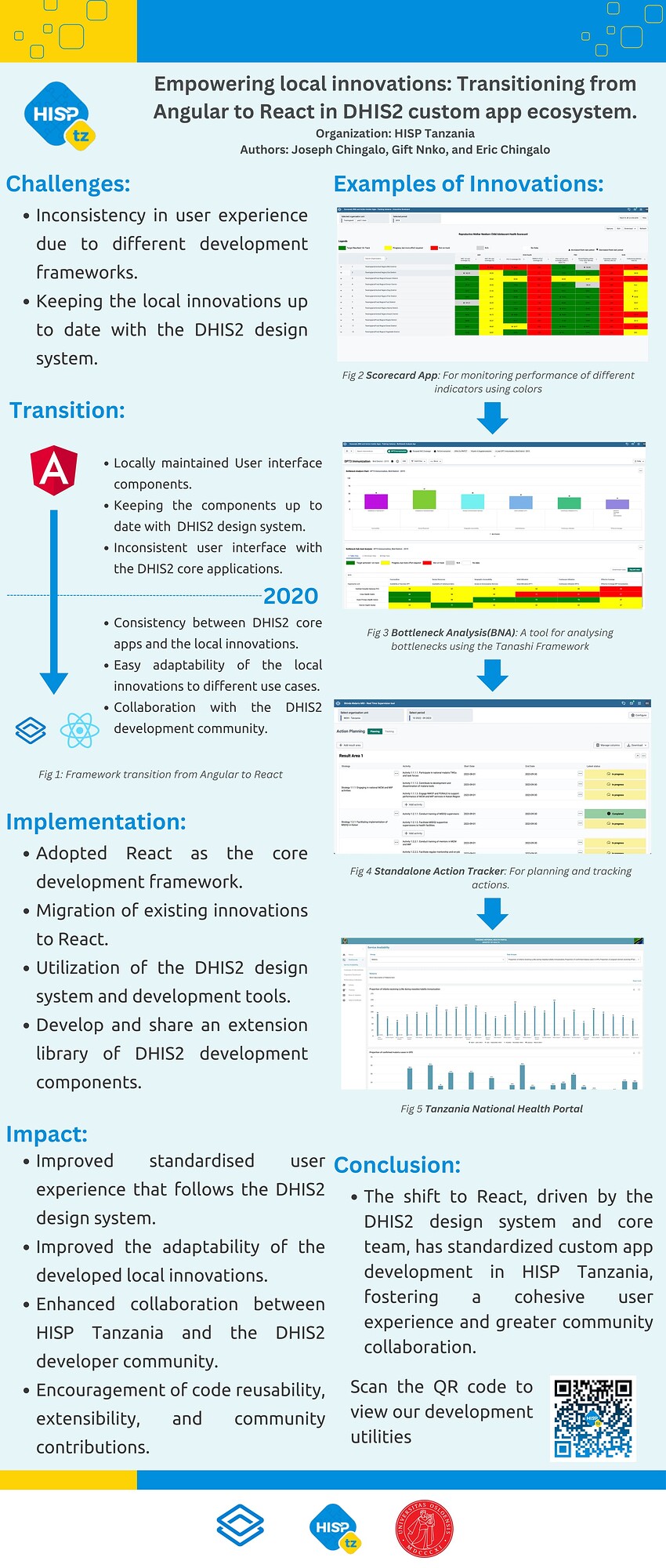This abstract has been accepted at the 2024 DHIS2 Annual Conference
Empowering local innovations: Transitioning from angular to React in DHIS2 custom app ecosystem
For the past couple of decades, HISP Tanzania has actively pursued innovation and development of various local custom applications to complement the functionalities of the DHIS2 platform. DHIS2 facilitates the expansion of functionalities through the creation of custom applications using JavaScript platforms. However, ensuring a consistent user experience across apps within the DHIS2 platform is crucial, and adherence to recommended design guidelines and principles for all DHIS2 apps is emphasized. Despite ReactJS being the preferred framework endorsed by the DHIS2 core team, HISP Tanzania has traditionally utilized Angular as the core JavaScript framework for development. Over the past two years, there has been a deliberate effort to transition the development ecosystem from Angularjs to ReactJS. This shift is essential to keep pace with changes and updates in React-based components, aligning with evolving design guidelines for DHIS2 app development. This transition aims to achieve consistency in user experience for existing apps and avoid duplicating efforts to accommodate new changes in both new and existing local innovations. To address these challenges, HISP Tanzania has standardized its development tools, embracing ReactJS as the core framework for building custom apps. This initiative includes the migration of existing local innovations, widely used within the community, while also extending tools and components for the benefit of community developers. This strategic move has not only fostered greater collaboration between HISP Tanzania’s development team and the DHIS2 community developers, including core developers but has also led to the enhancement and extension of existing reusable components for local applications. The transition to the ReactJS ecosystem has played a significant role in standardizing both existing and newly developed custom apps. This has resulted in a uniform user experience akin to other core DHIS2 applications, fostering code reusability, extensibility, and encouraging collaboration and contribution to the DHIS2 developer community.
Primary Author: Joseph Chingalo
Keywords:
Custom apps standards, DHIS2 Design Principles
Organization: HISP Tanzania ![]()
Authors: @chingalo, @nnkogift & @ericchingalo
Since late 2020, HISP Tanzania’s shift from Angular to React framework has revolutionized the development of DHIS2 custom applications, enhancing our local innovation’s functionality and user experience. Aligned with the DHIS2 design principles and DHIS2 development tools, this shift contributed to developing versatile and adaptable innovations like the Scorecard, Bottleneck Analysis, and the Standalone Action Tracker, which have been adopted across various implementations in different countries.
Join us at the 2024 DHIS2 Annual Conference’s Networking, Posters & Experts Lounge tables session on 10th June 2024 from 16:00 to 18:00 CET to dive into these innovations and connect with fellow health information pioneers.
